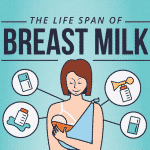Alternatives for Babies with a Dairy Intolerance or Allergy
Feeding your newborn should be a positive experience so if there are signs of discomfort during or shortly after eating, your baby may have a dairy intolerance or allergy. Dairy intolerance can occur when a baby has problems digesting milk, with the problem often being due to lactose. A dairy allergy can be more serious because the baby’s immune system negatively reacts to the proteins found in milk. Symptoms of a dairy intolerance or allergy can be as mild as a rash, upset tummy, and diarrhea, or as severe as bloody stool, constipation, vomiting and frequent spitting up.
Dairy intolerances and allergies can vary in severity and length of time, depending on the baby. This is why it’s important to speak to your pediatrician right away if you suspect either. If your doctor confirms an intolerance or allergy, some of the following options may be suggested:
- Lactose-free formula: Babies with lactose intolerance can thrive on lactose-free formulas, which are found in ready-to-drink and powdered options.
- Soy Formula: Several varieties of non-dairy soy formula are usually available at neighborhood grocery stores. Products may include different forms such as ready-to-drink and powdered formula, as well as organic and vegan options, for those parents striving for such a lifestyle for their family.
- Breastfeeding: Moms who are breastfeeding a baby with a dairy intolerance or allergy may want to speak with a dietitian or physician, as sometimes the dairy products mom eats can have a negative impact on their baby’s sensitive tummy. It’s also worth noting that if mom or dad has dairy intolerance or allergy, this doesn’t mean the baby will.
- Elemental Formula: Often prescribed by a doctor, elemental formula is “hypoallergenic”, which means it is extra gentle for your baby’s tummy. Talk to your pediatrician to see if an elemental or another hypoallergenic formula may be the right option for your baby. Also talk with your insurance company to see if a doctor’s prescription is needed to cover this type of formula.
And don’t forget, while dairy intolerance and allergies are common among kids, most children out-grow the allergy with time, so hang in there!





